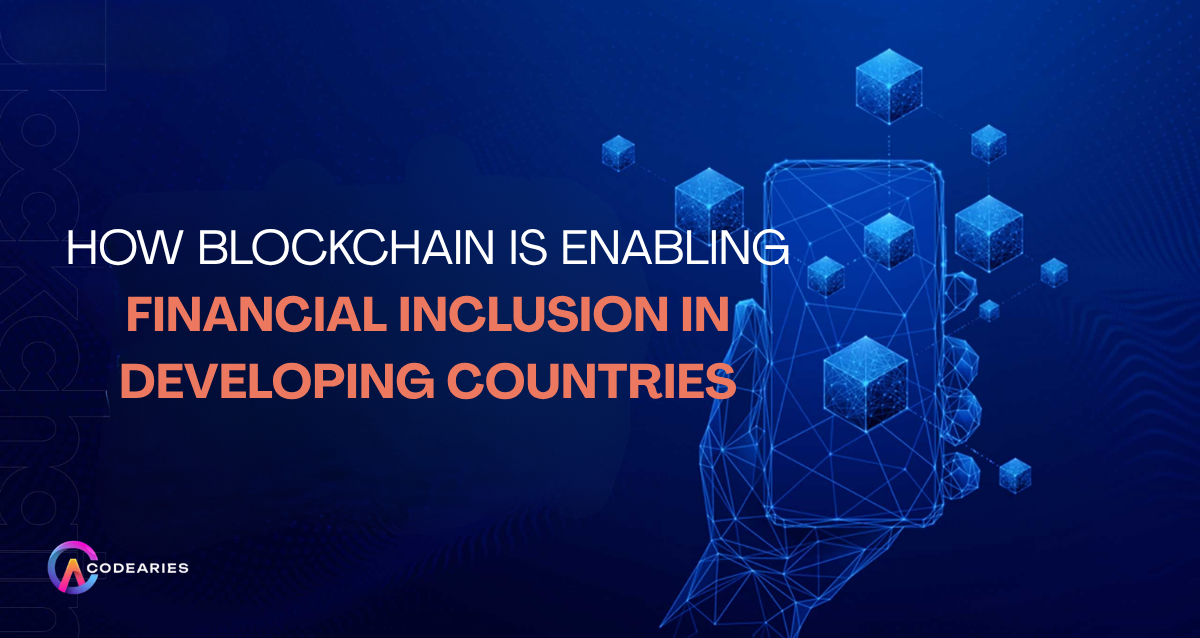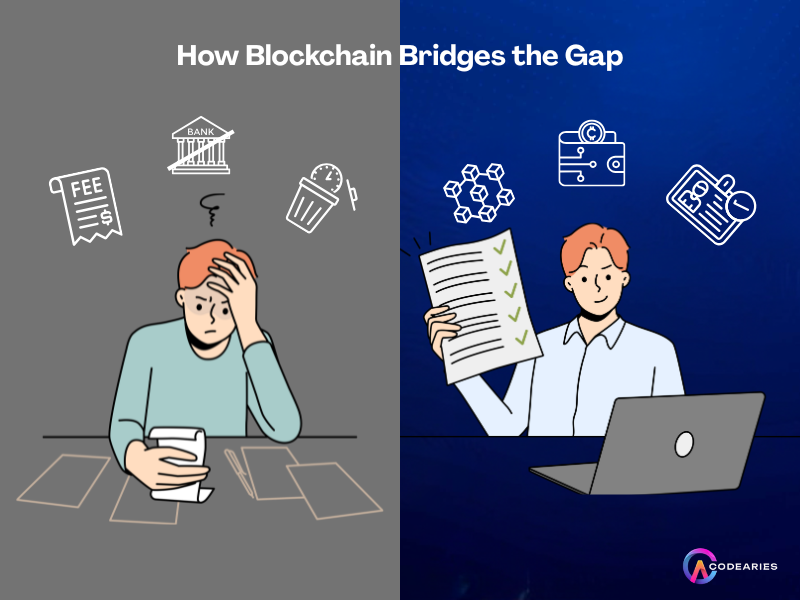
In today’s digital world, the gap between those who have access to financial services and those who do not is closing. This change is largely due to blockchain technology. For billions in developing countries, basic financial services are not just a convenience; they are essential for entrepreneurship, savings, insurance, and upward mobility. For decades, the global financial system has failed to serve the poorest and most remote populations, leaving them out of opportunities that people in developed nations often take for granted.
Understanding Financial Inclusion
Financial inclusion means making sure everyone, no matter their income, location, or background, can access and use affordable financial services. This includes savings, payments, credit, insurance, and money transfers. According to the World Bank, over 1.4 billion adults worldwide remain unbanked, most of them in developing regions across Africa, Asia, and Latin America.
Access to financial services is vital. It:
- Protects families in emergencies (through savings and credit)
- Helps small businesses grow (through loans)
- Reduces income inequality
- Empowers women and marginalized communities
Despite some progress from mobile banking and microcredit, traditional financial institutions often struggle to reach rural, undocumented, or low-income populations due to high costs, bureaucracy, and lack of necessary infrastructure.
The Barriers to Financial Inclusion
Before blockchain’s entry, existing barriers included:
- Geographical exclusion: Rural and remote regions have limited or no access to bank branches or ATMs.
- Documentation gap: Billions lack formal IDs, making it impossible to open a bank account.
- High transaction costs: International money transfers and microloans usually come with high fees that reduce value and discourage use.
- Lack of trust: Many people distrust financial intermediaries, like banks and lenders, due to corruption or poor management.
- Currency instability: Hyperinflation and currency risk reduce savings incentives and destroy value.
Technologies that could bridge this gap, such as fintech apps or mobile banking, still face challenges from outdated systems or centralized risks, especially in countries with unstable infrastructure or unreliable governance.
Blockchain: A Game Changer for the Unbanked
Blockchain technology, a secure and transparent digital ledger used in cryptocurrencies, provides new opportunities for financial inclusion.
1. Decentralized Access to Basic Finance
With blockchain, anyone with a basic smartphone or internet-enabled device can:
- Open a digital wallet (no need for a bank or paperwork)
- Send and receive funds globally 24/7
- Earn, borrow, or save using crypto-based platforms
This reduces reliance on traditional banks, lowers fees, and gives people direct access to financial services—sometimes for the first time.
2. Borderless & Low-Cost Remittances
Remittances exceed $600 billion annually in many developing communities, but fees can range from 5–10%. Blockchain-based transfers using stablecoins or platforms like Stellar and Ripple can reduce these fees to almost zero and deliver funds almost instantly and securely.
3. Microlending and Peer-to-Peer Finance
Microcredit programs have helped millions rise out of poverty, but challenges remain, like middlemen, high interest rates, and inconsistent oversight. Blockchain-enabled decentralized finance (DeFi) platforms let individuals or small businesses in developing areas borrow or lend money globally, with smart contracts ensuring fair terms and transparency. Platforms like Aave or Celo make small loans possible without traditional banks.
4. Alternative Credit Scoring
Traditional credit systems often rely on employment history and formal documentation, which many poor individuals lack. Blockchain allows for alternative and transparent credit scoring by securely recording repayment histories, business transactions, or community endorsements, making it easier for the underbanked to get larger loans in the future.
5. Digital Identity & KYC
The lack of verifiable identification is a key barrier to financial inclusion. Blockchain supports Self-Sovereign Identity (SSI), where individuals manage their digital IDs securely. This can be used across platforms and borders for account opening, accessing government services, or participating in local economies. Projects like Kiva Protocol and uPort are testing decentralized ID systems in Africa and Asia.
6. Stable Digital Currencies
Hyperinflation affects many developing economies, such as Venezuela and Zimbabwe. Blockchain-based stablecoins, which are linked to reliable assets like the US dollar or euro, allow residents to save, transact, and build wealth without risking a local currency collapse.
7. Transparent Aid and Subsidy Distribution
Corruption and mismanagement often prevent aid from reaching those who need it. With blockchain, every payment is traceable, cutting out middlemen and ensuring resources are delivered to the right people. For example, the World Food Programme used blockchain in its “Building Blocks” project to provide aid to Syrian refugees, reducing fraud and costs.
8. Agricultural Supply Chains and Microinsurance
Many small-scale farmers lack weather insurance and transparency in crop pricing. Blockchain solutions offer secure records for tracking supply chains and smart contracts for microinsurance payouts after negative events like droughts or floods, offering greater stability and opportunities.
9. Empowerment for Women and Marginalized Groups
In many societies, women and minorities face extra barriers to financial services. Blockchain systems can provide direct, private, and independent access to finance. All someone needs is a digital device; factors like gender, background, or literacy become less relevant.

Real-World Examples in Action
- BitPesa (Africa): Facilitates low-cost, blockchain-based remittances and business payments across African borders.
- Celo (Global): A mobile-first platform providing users with stablecoins and DeFi services using only a phone number for access.
- Kiva Protocol (Sierra Leone): Delivers digital identity verification and credit recording for citizens to access financial services.
- BanQu (Latin America, Africa): Connects unbanked farmers to supply chains and global markets, verifying their economic activity via blockchain.
- World Food Programme (Middle East): Delivers humanitarian aid faster, cheaper, and more transparently to refugees using blockchain systems.
Challenges and Considerations
While blockchain holds immense promise, several hurdles remain:
- Infrastructure limitations: Reliable internet/mobile coverage is uneven in many rural or impoverished areas.
- Digital literacy: Education and support are critical for sustainable adoption among low-literacy populations.
- Regulatory uncertainty: Unclear policies can restrict blockchain startups or lead to consumer risk.
- Fraud and scams: The openness of blockchain means users must be protected and educated about risks, especially in lightly regulated ecosystems.
- Privacy and security: Balancing blockchain’s transparency with sensitive data protection is critical.
The Road Ahead
The movement toward blockchain-enabled financial inclusion is speeding up. As infrastructure improves and digital literacy rises, and as more user-friendly apps are developed, blockchain’s reach will expand into underrepresented populations. Partnerships among blockchain startups, NGOs, governments, and financial institutions will further drive adoption and increase impact.
How Codearies Helps Achieve Financial Inclusion with Blockchain
At Codearies, we want to make financial access universal. We assist governments, NGOs, fintech startups, and social enterprises in creating and adopting blockchain solutions that fit emerging markets and financial inclusion efforts.
Our Unique Approach Includes:
Custom Blockchain Platforms:
We design permissioned and public blockchain systems for payments, remittances, microlending, and more, ensuring scalability, low fees, and reliability.
Mobile-First Wallets:
We create user-friendly digital wallets that function even on basic devices and low-network settings, removing technical obstacles for users.
Self-Sovereign Identity (SSI):
Our engineers develop decentralized ID solutions that empower undocumented individuals to securely access financial services, government aid, and e-commerce.
Stablecoin & Digital Currency Integration:
Codearies incorporates stablecoin capabilities to help communities avoid local currency volatility and facilitate cross-border, peer-to-peer payments.
Transparent Aid Distribution:
We create traceable grant and payment systems for donors, humanitarian groups, and governments to ensure that funds reach those in need.
Localized Solutions:
We support local languages and integrate region-specific regulations, crafting blockchain apps that truly meet community needs.
Capacity Building & Training:
Our team offers extensive training resources and ongoing support to help organizations and local partners manage solutions independently in the long run.
With a skilled team of blockchain architects, financial inclusion specialists, and compliance experts, Codearies connects top-notch technology with real-world effects
Frequently Asked Questions (FAQs)
How can Codearies help a microfinance institution expand digital lending in rural areas?
Codearies develops microloan platforms on blockchain with alternative credit scoring, mobile access, and automated risk controls, making rural microlending cost-effective, transparent, and safer for all parties.
What steps does Codearies take to ensure solutions are accessible for people with low digital literacy?
We create simple, low-bandwidth wallet apps, provide multilingual support, gamified onboarding, and conduct community outreach and education to build user confidence and encourage adoption.
Can Codearies enable compliant digital identity for customers without formal documents?
Yes. Our SSI solutions use a mix of community verification, biometric authentication, and other decentralized credentials to securely onboard customers, even without traditional government IDs.
How does Codearies address concerns over fraud and data security in blockchain-based financial services?
We incorporate security at every step, from thorough smart contract audits to encrypted user data and real-time fraud detection, alongside user education and compliance with regulations.
What industries or organizations can partner with Codearies for blockchain-enabled financial inclusion?
We welcome microfinance institutions, NGOs, banks, government agencies, payment providers, cooperatives, agricultural organizations, and fintech startups. We customize blockchain solutions to fit each partner’s mission and context.


